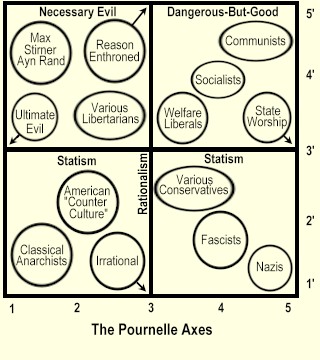This is in response to Uriel's 2/21 Post
Sorry I missed that at first, this thread had mainly seized on beating the concept of "common sense" (obviously nonproductive in a sharply polarized country of red and blue) to death, then moved to rationality.
I was more focused on why there IS so much friction, and the fundamental MISUNDERSTANDING which causes good men to fight with such vitriol over trivialites.
I personally like the Pournelle axes for this purpose. More descriptive, and with less emotional baggage with the words.
Pournelle is a smart guy. And he recognizes essentially the same 4 philosophies, he just relabels the X-Y Axis. This is a thing about statistics--when you do a factor analysis, you get these 4 factors, but the statistics program doesn't give you a NAME for the factor, it is just "Factor1-4" --it is up to people to name their philosophy or movement, and they are often highly creative in doing so. (Fascism in Germany was 'National Socialism" Fascism in America is "Christian Conservatism" (
http://ec1.images-amazon.com/images/P/0743284437.01._AA240_SCLZZZZZZZ_.jpg)
But I must disagree that there is less emotional bagages in his words:

By making the making the major "North South" Axis "Rationalism" Pournelle declares "Fascism is irrationalist; it says so in its theoretical treatises" -- defining a major political philosophy "irrational" is pretty baggage laden. Most Fascists I know believe themselves to be pretty pragmatic people. They want law and order and the trains to run on time.
Rokeach had the same 2 Axis, but he was truly less emotional... the Axis are:
Freedom
and
Equality
See there are both GOOD values. Everybody believes in Freedom, and Everybody believes in Equality.
But if they had to fight it out--if you had to pick just one--which would win? That is what makes you what you are, politically.
Capitalist=Freedom High, Equality Low
Socialist = Freedom High, Equality High
Communist=Equality High, Freedom Low
Fascist=Freedom Low, Equality Low
To me, it just drips out of their writings. Do their philosophers speak of the commonality of man (I have a dream?) or are they focusing on singling out groups "inferior" to demonstrate inherent inequality? (Jews, gays, Muslims, secular humanists, welfare queens). Do they wish to be unfettered completely or do they tolerate restrictions on Freedom for the "common good"?
Except Communism (as practiced in the USSR and China, the latter of which you cite) are fascist states. This causes futher confusion.
Of course you are right, as did the Nazi use of "National Socialism" confuse everyone. I would say Venezuela then as an example... Human nature being what it is, don't all Communists states drift toward Fascism with time?
Where do you deal with issues like market failures in a capitalist society? Are education and healthcare really public goods as you imply here? If so, what levels of each are public goods? Why?
I think that is why we bounce back and forth between Republican and Democratic rule. Enlightened Capitalists realize we need an educated and healthy workforce, but some people want to make their million (or Billion) now and screw the future. I read that General Motors suffers a $1,000 per car cost penalty vs. a European Car, because GM is saddled with health care costs for workers and retirees, whereas the Government picks up that tab in Germany, so it is not a direct cost to the manufacturer--gives Japan and Germany a huge worldwide competitive advantage. GM would obviously like to see National Health insurance, which is a Socialist idea.
